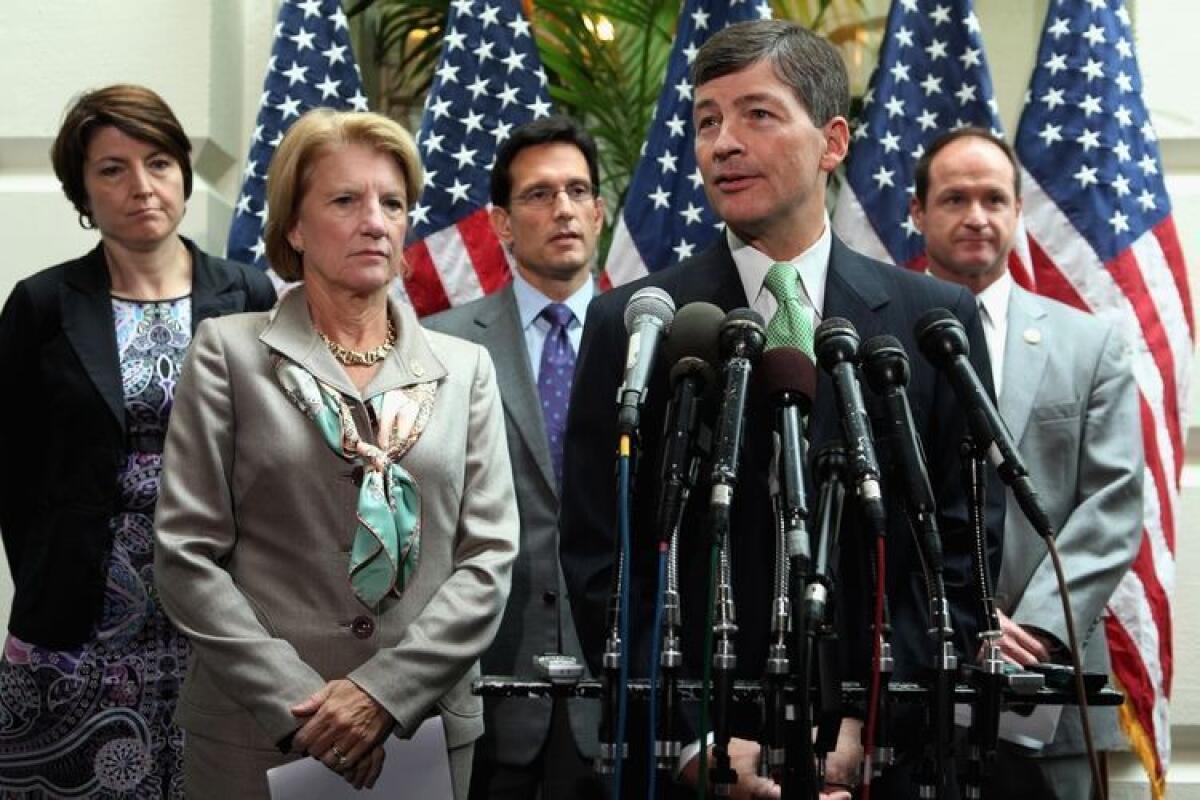McManus: Pity the ‘super committee’

- Share via
Pity the poor “super committee.” Congress’ special task force on the deficit already had a mission that looked nearly impossible: producing a plan to reduce the federal government’s fiscal gap by $1.2 trillion over 10 years. And then the job got harder.
House Speaker John A. Boehner (R-Ohio) planted a partisan flag and said he wouldn’t accept any proposal from the committee that included tax increases. President Obama responded this week with a partisan flag of his own, saying he wouldn’t support a proposal that did not raise taxes on the wealthy.
Meanwhile, a bunch of senators and fiscal experts said the committee shouldn’t stop at $1.2 trillion; rather it should “go big” and try for a $4-trillion “grand bargain.” And all this has to happen in the next six weeks in order for the task force to produce legislation by its deadline of Nov. 23.
A mission that once appeared merely impossible now looks inconceivable.
The committee might have a better chance if its members would commit themselves to bipartisanship in action, not just in words. But that’s unlikely. Four of them (two Democrats and two Republicans) also served on Obama’s debt commission, which was chaired by former Sen. Alan Simpson (a Republican) and former Bill Clinton aide Erskine Bowles (a Democrat). But all four voted against the compromise that Simpson and Bowles proposed.
The committee’s co-chairs, Rep. Jeb Hensarling (R-Texas) and Sen. Patty Murray (D-Wash.), had never even met each other before the panel was named. They’re smart and serious people, but they’re also party loyalists, chosen in part because they would be reliable proxies for their leaders, Boehner in the House and Harry Reid (D-Nev.) in the Senate.
My prediction? Over the next six weeks, we’ll see the committee toil, and we’ll hear its members express a heartening determination to get the job done. But their deliberations will end in yet another deadlock.
Democrats will continue to demand tax increases and Republicans will continue to refuse them. Each side will say the logjam is evidence of the other’s intransigence. Then, theoretically, automatic spending cuts will kick in — terrible, deep cuts in domestic and defense spending. Except they won’t.
Congress has, characteristically, given itself an escape hatch. Under the deal that established the super committee, automatic budget cuts wouldn’t take effect for a year. If no compromise is reached, the trigger gets pulled at the end of 2011, but the bullet doesn’t strike until January 2013.
In other words, even after Nov. 23 the legislators have another year to fix the problem (or delay the cuts). Congress exempts itself from most federal laws, but it seems perfectly happy to accept Parkinson’s Law: Work expands to fill the time available for its completion.
That doesn’t mean the trigger would have no consequences. If “uncertainty” is one of the factors stifling the economy, imagine the uncertainty that defense industries, say, will face if $600 billion in Pentagon cuts are hovering on the horizon as a possibility but not a certainty.
Congress also gave itself a second escape route: a partial fix. If the committee comes up with only $1 trillion in cuts, for example, it can recommend those and leave only the remaining $200 billion for the automatic cuts.
At this point, members of the committee still say they’re determined to fashion a different ending, and there’s no doubt they’d like to. The panel’s members all have a vivid memory of how the collapse of deficit-reduction talks this summer drove Congress’ approval ratings into the cellar and the financial markets into a tailspin. They’d love to deliver an outcome that boosted both economic confidence and their own standing.
One other factor might help too: Expectations are low. Any agreement, even a small one, will make Congress look better than it does now.
Still, it isn’t realistic to expect a committee to produce a grand bargain in six weeks; they don’t have the authority to do it. (Even Boehner and Reid, if they stepped in, don’t appear to have the authority to do it.)
But what the committee might be able to do is lay the groundwork for a “better-than-nothing bargain” that acknowledges a few hard truths each side must accept.
Both sides already agree that tax reform should be part of the package. But more Republicans need to agree that tax reform should be designed to produce more revenue by making the tax code fairer — for example, by eliminating the undeserved tax break that hedge-fund managers now enjoy.
Both sides already agree that domestic spending cuts will be part of the package. But more Democrats need to find a way to embrace controls on the growth of Medicare spending instead of denouncing every proposal as an assault on the elderly.
The super committee almost certainly won’t achieve the ambitious goals that others have set for it. But compared to Congress’s recent performance, even a minimal deal -- a better-than-nothing bargain -- would look almost super.
More to Read
Sign up for Essential California
The most important California stories and recommendations in your inbox every morning.
You may occasionally receive promotional content from the Los Angeles Times.














